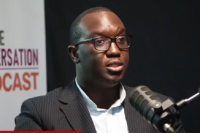ANTI-Voter Apathy (AVAP) executive director Richwell Mulwani says it is not possible for government to create a platform for its citizens in the diaspora to vote in the 2021 general election because implementing the scheme could prove challenging.
According to Ministry of Foreign Affairs Permanent Secretary Chalwe Lombe, the Ministry is due to engage the Electoral Commission of Zambia (ECZ) to see if it could create a platform for Zambians living in the diaspora to vote during the 2021 general election.
But Mulwani said while the initiative was progressive, it was a scheme that required time to be tried and tested before implementing at next year’s general election, given the huge volume of citizens living abroad that may want to cast a ballot.
“It’s a serious undertaking which can’t be done right now. I think it can’t work for Zambia in the 2021 election, maybe in the 2026 election. But at the moment, it’s not possible because all political party leaders need to agree. Yes, indeed, this is a very good undertaking and everything needs to be very transparent and there must be accountability. But in the absence of that, people will question the results. They will even petition the results,” Mulwani cautioned.
He wondered if the ECZ even had the capacity to send representatives to go and supervise elections in all the countries where Zambians are based.
“We should also not forget that there is variation in terms of time. Remember that, elections in Zambia are held from 06:00 hours to 18:00 hours and all those that are on the queue, once it’s 18:00 hours, a police officer has to stand behind that queue and only those in front of him are allowed to vote. Now, if you allow one who is in America to vote from there, what time will it be in America? What time is going to be in the UK? What time is it going to be in the other countries? And those variations can create problems. We want to urge the Ministry of Foreign Affairs that it is a very good idea, but the question is how are we going to prepare ourselves in terms of making sure that those in the diaspora vote in a peaceful and transparent manner? Is ECZ able to send their staff everywhere in other countries so that they can register voters and conduct elections in those particular countries? Where are they going to do this? Are they going to do it at the embassies or they are going to create certain places, which they are going to use as voter registration centres or polling centres? How is it going to be done? Are the opposition going to be engaged in these matters?” Mulwani wondered.
“This is a serious consideration in terms of how that can be done. We should not forget that the Zambian government has people in embassies and those that represent us. And the issue is, how are they appointed in those positions? We know that these people in these missions vote from embassies and the question is: who is going to conduct those elections? Are political parties going to accept the results coming from those countries where Zambians are voting from? We need to also have a register of voters, which is also a very serious undertaking.”
He added that it required all stakeholders to extensively deliberate and agree to.
“As AVAP, we still feel that there is a lot that can be done for us to reach that conclusion. It’s not a matter of rushing. It’s something that needs to be discussed, agreed to, and looking at the modalities of how it’s going to be done. Yes, those Zambians living in other countries need to be given a platform so that they can participate in the affairs of their country. It has been an issue that we need to provide a platform for the people of Zambia living in other countries to vote in an election. It’s true that we have seen other countries doing the same and we have not seen any problem with that in other countries doing that and we don’t hear any allegations of election rigging. It is a very important undertaking so that Zambians living outside the country can also vote,” said Mulwani.












